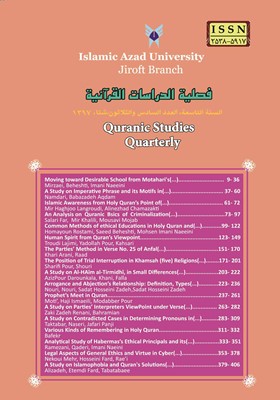-
-
List of Articles
-
Open Access Article
1 - Moving toward Desirable School from Motahari's View Point by citing Holy Quran Verses
Leila Mirzaei Saeed Beheshti Mohsen Imani Naeeini -
Open Access Article
2 - A Study on Imperative Phrase and its Motifs in Surah al-Ma'idah
Ibrahim Namdari Asgar Babazadeh Aqdam -
Open Access Article
3 - Islamic Awareness from Holy Quran’s Point of View
Seyyedeh Saeedeh Mir Haghjoo Langroudi Fatemeh Alinezhad Chamazakti -
Open Access Article
4 - An Analysis on Quranic Bsics of Criminalization of Environmental Crimes
Abouzar Salari Far Seyyed Mahmoud Mir Khalili Seyyed Doraid Mousavi Mojab -
Open Access Article
5 - Common Methods of ethical Educations in Holy Quran and Letter No. 31 of Nahj Al Balaghah
Homayoun Rostami Saeed Beheshti Mohsen Imani Naeeini -
Open Access Article
6 - Human Spirit from Quran’s Viewpoint
Abedin Troudi Lajimi Mohammad Hadi Yadollah Pour Reza Kahsari -
Open Access Article
7 - The Parties’ Method in Verse No. 25 of Anfal Surah
Somayyeh Khari Arani Ali Raad -
Open Access Article
8 - The Position of Trial Interruption in Khamsah (five) Religions by Emphasizing Verses and Traditions
Feysal Sharifi Pour Fatemeh Shouri -
Open Access Article
9 - A Study on Al-Ḥakīm al-Tirmidhī, in Small Differences in Preventing Small Discrepancies
Shamseddin AzizPour Darounkala Hamed Khani Ibrahim Fallah -
Open Access Article
10 - Arrogance and Abjection’s Relationship: Definition, Types, Consequences and Treatment from Quran’s Verses Viewpoint
Mahdiyeh Nouri Mahboobeh Nouri Samaneh Sadat Hosseini Zadeh Sediqeh Sadat Hosseini Zadeh -
Open Access Article
11 - Prophet’s Meet in Quran
Mousa Modabber Pour Mahdi Moti’ Mohammad Reza Haji Ismaeili -
Open Access Article
12 - A Study on Parties’ Interpreters ViewPoint under Verse No. 43 of Muddathir Surah
Alireza Zaki Zadeh Renani Akram Bahramian -
Open Access Article
13 - A Study on Contradicted Cases in Determining Pronouns in Quran Translation
Hossein Taktabar Mahdi Naseri Mohammad Jafari Panji -
Open Access Article
14 - Various Kinds of Remembering in Holy Quran
Sardar Bafekr -
Open Access Article
15 - Analytical Study of Habermas’s Ethical Principals and its Critics from Quranic View Point
Adel Ramezani Mostafa Qaderi Mohsen Imani Naeini -
Open Access Article
16 - Legal Aspects of General Ethics and Virtue in Cyber Space by Quranic Approach
Nafiseh Nekoui Mehr Atfeh Hosseini Fard Masoud Rae’i -
Open Access Article
17 - A Study on Islamophobia and Quran's Solutions
Zahra Alizadeh A'zam Etemdi Fard Mina Sadat Tabatabaee
-
The rights to this website are owned by the Raimag Press Management System.
Copyright © 2021-2026







